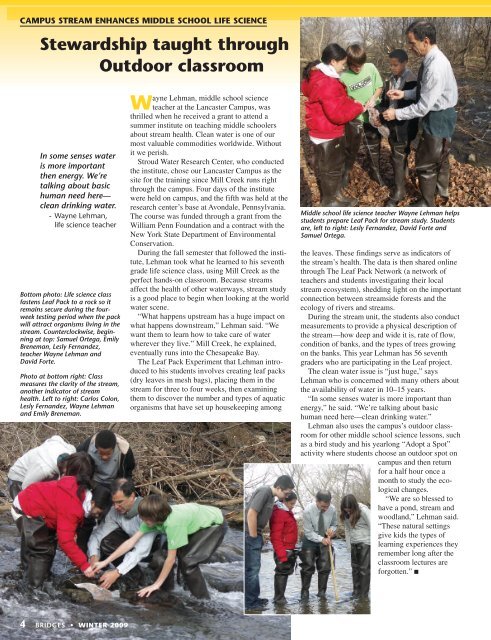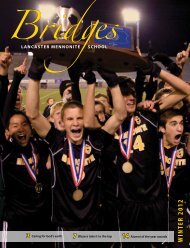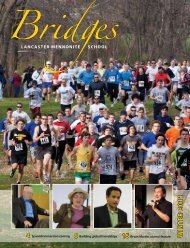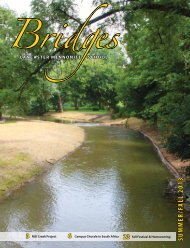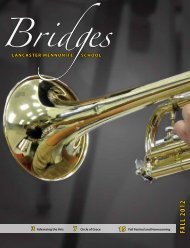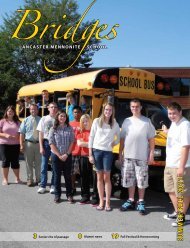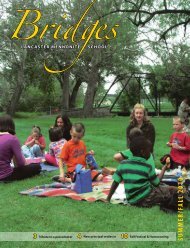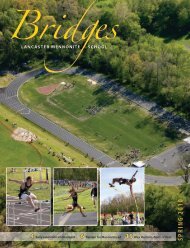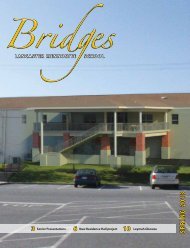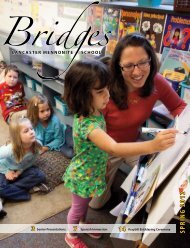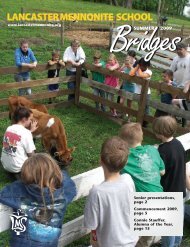You also want an ePaper? Increase the reach of your titles
YUMPU automatically turns print PDFs into web optimized ePapers that Google loves.
CAMPUS STREAM ENHANCES MIDDLE SCHOOL LIFE SCIENCEStewardship taught throughOutdoor classroomIn some senses wateris more importantthen energy. We’retalking about basichuman need here—clean drinking water.- Wayne Lehman,life science teacherBottom photo: Life science classfastens Leaf Pack to a rock so itremains secure during the fourweektesting period when the packwill attract organisms living in thestream. Counterclockwise, beginningat top: Samuel Ortega, EmilyBreneman, Lesly Fernandez,teacher Wayne Lehman andDavid Forte.Photo at bottom right: Classmeasures the clarity of the stream,another indicator of streamhealth. Left to right: Carlos Colon,Lesly Fernandez, Wayne Lehmanand Emily Breneman.Wayne Lehman, middle school scienceteacher at the <strong>Lancaster</strong> Campus, wasthrilled when he received a grant to attend asummer institute on teaching middle schoolersabout stream health. Clean water is one of ourmost valuable commodities worldwide. Withoutit we perish.Stroud Water Research Center, who conductedthe institute, chose our <strong>Lancaster</strong> Campus as thesite for the training since Mill Creek runs rightthrough the campus. Four days of the institutewere held on campus, and the fifth was held at theresearch center’s base at Avondale, Pennsylvania.The course was funded through a grant from theWilliam Penn Foundation and a contract with theNew York State Department of EnvironmentalConservation.During the fall semester that followed the institute,Lehman took what he learned to his seventhgrade life science class, using Mill Creek as theperfect hands-on classroom. Because streamsaffect the health of other waterways, stream studyis a good place to begin when looking at the worldwater scene.“What happens upstream has a huge impact onwhat happens downstream,” Lehman said. “Wewant them to learn how to take care of waterwherever they live.” Mill Creek, he explained,eventually runs into the Chesapeake Bay.The Leaf Pack Experiment that Lehman introducedto his students involves creating leaf packs(dry leaves in mesh bags), placing them in thestream for three to four weeks, then examiningthem to discover the number and types of aquaticorganisms that have set up housekeeping amongMiddle school life science teacher Wayne Lehman helpsstudents prepare Leaf Pack for stream study. Studentsare, left to right: Lesly Fernandez, David Forte andSamuel Ortega.the leaves. These findings serve as indicators ofthe stream’s health. The data is then shared onlinethrough The Leaf Pack Network (a network ofteachers and students investigating their localstream ecosystem), shedding light on the importantconnection between streamside forests and theecology of rivers and streams.During the stream unit, the students also conductmeasurements to provide a physical description ofthe stream—how deep and wide it is, rate of flow,condition of banks, and the types of trees growingon the banks. This year Lehman has 56 seventhgraders who are participating in the Leaf project.The clean water issue is “just huge,” saysLehman who is concerned with many others aboutthe availability of water in 10–15 years.“In some senses water is more important thanenergy,” he said. “We’re talking about basichuman need here—clean drinking water.”Lehman also uses the campus’s outdoor classroomfor other middle school science lessons, suchas a bird study and his yearlong “Adopt a Spot”activity where students choose an outdoor spot oncampus and then returnfor a half hour once amonth to study the ecologicalchanges.“We are so blessed tohave a pond, stream andwoodland,” Lehman said.“These natural settingsgive kids the types oflearning experiences theyremember long after theclassroom lectures areforgotten.” ■4 BRIDGES • WINTER <strong>2009</strong>


